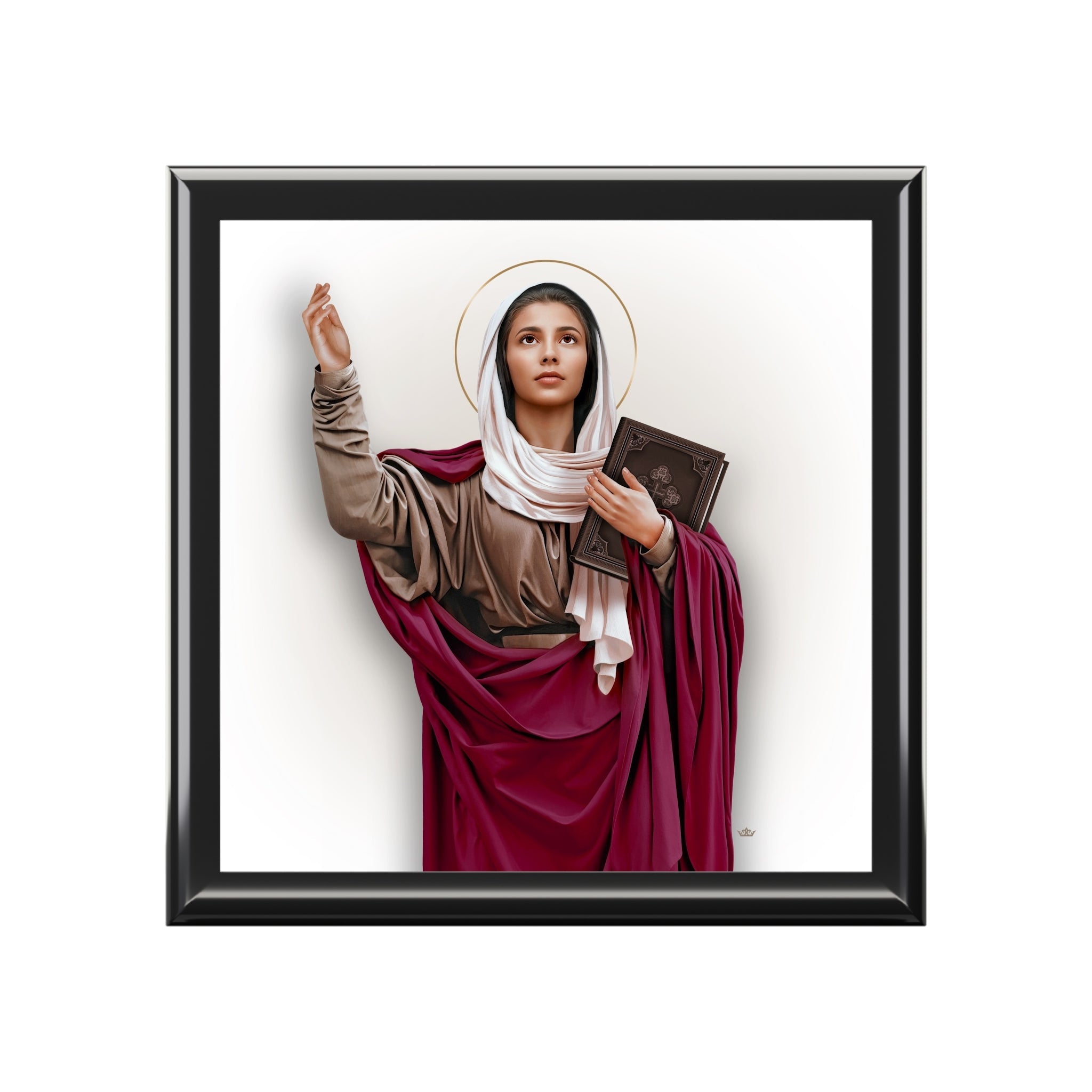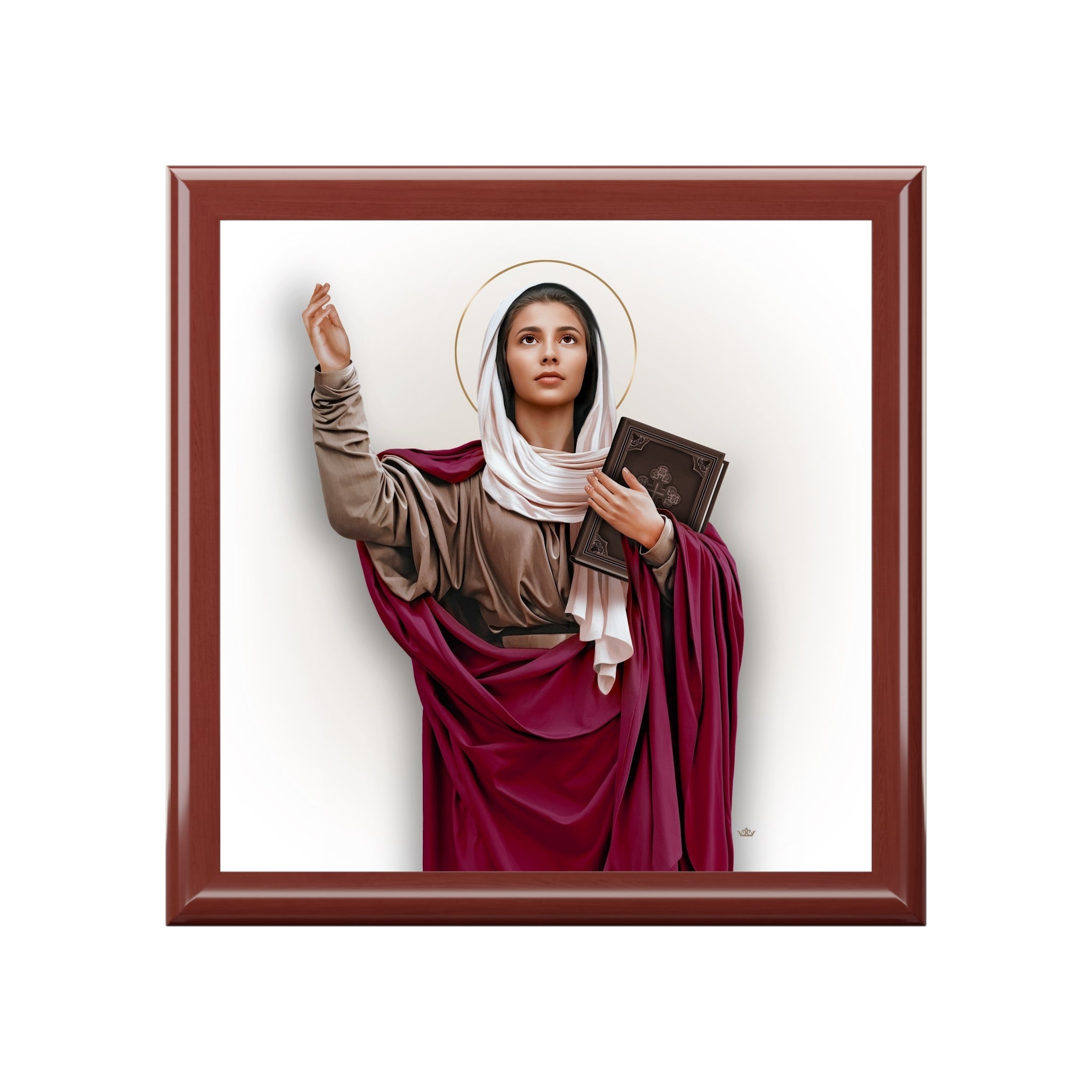





St. Monica Keepsake Box
The St. Monica Keepsake Box is a treasure that holds and protects your treasures. This keepsake box is made of high-quality Rubberwood (Hevea Brasiliensis) with a varnish finish. It features a sublimation printed image on a glossy ceramic tile insert, a soft, velvet-like felt interior and dual hinges which lock at 90 degrees. Perfect for holding jewelry, rosaries, watches, keys, cuff links, tie clasps, baby momentos, and any other items you want to keep organized and protected. A treasure to have or a treasure to give as a gift.
■ Dimensions: 7.12"W x 7.12"L x 2.89"H
■ Soft Felt Lining

This is a couture item which is custom made-on-demand. Our couture collections feature exclusive, custom designs with our signature crown somewhere within the design. Not sold in stores and you won’t find this anywhere else. EXCLUSIVELY AT VENXARA.
Shipping + Delivery
These custom made-on-demand Keepsake Boxes ship world-wide directly from our producers in California, USA. Destination tracking is available for most countries. A tracking number will be emailed to you once your order has shipped.
Production Time: 2-4 days
Ship Time: 4-10 days
Please Note: During peak shopping seasons, production and ship time may take a little longer than normal. If you are buying this item as a gift, please order as early as possible. We don't want to disappoint you or the gift recipient with a potentially delayed order.
For countries where tracking numbers are not available, this item should arrive by regular post within 2-4 weeks. Orders that have not arrived within 45 days of order processing are eligible for a free reshipment or a refund.
About St. Monica

ST. MONICA
332 — 387
Feast Days May 4 (Traditional) August 27 (New)
Patron Saint of married women, difficult marriages, widows, mothers, disappointing or wayward children, victims of adultery and abuse and conversion of relatives.
Monica's holy example and fervent intercession led to one of the most dramatic conversions in Church history. She is remembered and honored for her outstanding Christian values, particularly the suffering caused by her husband's adultery and abuse, and her prayerful life dedicated to the reformation of her son St. Augustine, who wrote extensively of her pious acts and life with her in his autobiographical work Confessions.
Monica is believed to have been a Berber born into a Catholic family in the North African city of Thagaste (present-day Souk Ahras, Algeria). She was raised by a maidservant who taught her the virtues of obedience and temperance.
While still relatively young, her parents gave her in marriage to a pagan, Patricius, a Roman civil servant with a violent temper and a disdain for his wife's religion. Monica dealt patiently with his distressing behavior, which included abuse and infidelity to their marriage vows. But she experienced a greater grief when he would not allow their three children – Augustine, Nagivius, and Perpetua – to be baptized.
Monica's long-suffering patience and prayers eventually helped Patricius to see the error of his ways, and he was baptized into the Church one year before his death in 371. Her oldest son, Augustine, however, soon embraced a way of life that brought her further grief, as he fathered a child out of wedlock, was living a reckless and immoral life and he began to practice the occult religion of Manichaeism. For a while, she refused to let him eat or sleep in her house. Then one night she had a vision that assured her Augustine would come to the faith.
From that time on, she stayed close to her son, praying and fasting for him. When he was 29, Augustine decided to go to Rome to teach rhetoric. One night he told his mother that he was going to the dock to say goodbye to a friend. Instead he set sail for Rome. Monica was heartbroken when she learned of Augustine’s trick, and decided to follow him. Yet even this painful event would serve God's greater purpose, as Augustine left to become a teacher in the place where he was destined to become a Catholic.
She arrived in Rome only to find that he had left for Milan. Although travel was difficult, Monica pursued him to Milan. Once in Milan, Monica drew encouragement from her son's growing interest in the saintly preaching of the bishop St. Ambrose. After three years of struggle against his own desires and perplexities, on Easter 387, St. Ambrose baptized Augustine and several of his friends. Soon after, his party left for Africa.
Although no one else was aware of it, Monica knew her life was near the end. She became ill shortly after and suffered severely for nine days before her death. Monica died at age 56, in the year 387. She has become the inspiration for the St. Monica Sodality, which encourages prayer and penance among Catholics whose children have left the faith.
Choose options






